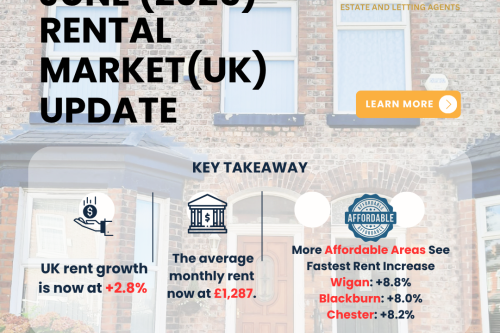- Free Valuation
- Competitive Sales Commission Fees
- Free Mortgage Advice

posted 8th July 2025
The UK rental market has entered a new phase of stability following years of steep increases—and Manchester is no exception. After a 4-year surge, rental growth in the city has started to cool, driven by shifting tenant demand, affordability challenges, and evolving supply conditions.
Rental Growth Slows in Manchester
Over the past three years, rents across the UK rose by 21%, but the rate of growth has now slowed significantly. As of April 2025, national rent inflation has fallen to 2.8%, the lowest in four years. Manchester has mirrored this cooling trend, particularly in the city centre and premium rental brackets.
While rents remain elevated compared to pre-pandemic levels, the steep price jumps seen between 2022 and 2023 have eased. The current environment is less about sharp increases and more about stabilisation—welcome news for tenants but still challenging for those on modest incomes.
Demand Shifts, But Competition Still Strong
Tenant demand in Manchester has dipped compared to the peaks of 2022–2023, partly due to a 16% national decline in rental inquiries. Factors include reduced migration for work and study, and an improving mortgage market that's helping some renters become first-time buyers.
However, demand in Manchester remains well above pre-pandemic levels, especially in the most affordable areas. Despite a 17% increase in available rental stock year-on-year, competition remains high, particularly for well-priced properties in popular districts like Rusholme, Levenshulme, and Salford.
Affordability Pressure Shifts Demand to Outskirts
High rents and affordability constraints are pushing more renters out of the city centre and into neighbouring towns and suburbs. Locations like:
Wigan (+8.8%)
Blackburn (+8.0%)
Chester (+8.2%)
…are seeing stronger growth than central Manchester itself, where the market is starting to plateau.
This shift is being fuelled by renters searching for better value without sacrificing access to jobs, transport links, and amenities.
Supply Is Rising—But Still Not Enough
The good news: supply is improving. More properties are available to rent now than this time last year, and some landlords are returning to the market as borrowing costs ease.
The bad news: we’re still operating with 20% fewer rental homes than pre-2020. While the ‘Build to Rent’ sector continues to expand in Manchester with developments around Ancoats, Deansgate, and MediaCity, the entry-level and mid-range market remains severely undersupplied.
Outlook for Manchester – Rest of 2025
We expect rental prices in Manchester to continue rising modestly at around 3–4% through the rest of 2025, in line with national forecasts. Key trends to watch include:
- Faster growth in outer boroughs and commuter towns, as affordability becomes the main driver.
- Stable or slowing rents in high-cost zones, especially if more renters transition into home ownership.
- Ongoing pressure on low-to-middle income tenants, who face limited options amid stiff competition.
Unless meaningful efforts are made to increase affordable rental stock in and around Manchester, the squeeze on tenants is likely to persist—despite slower rental inflation.






